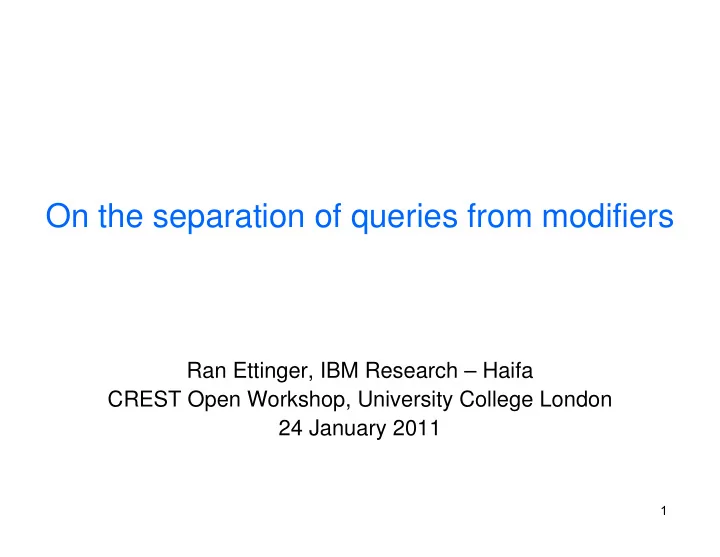

On the separation of queries from modifiers Ran Ettinger, IBM Research – Haifa CREST Open Workshop, University College London 24 January 2011 �
Separate Query from Modifier (SQfM) • A refactoring technique by Martin Fowler* – “ You have a method that returns a value but also changes the state of an object. ” – “Create two methods, one for the query and one for the modification.” • Inspired by Bertrand Meyer’s Command Query Separation (CQS) • This talk: – Outline of a first algorithm to support the automation of this refactoring – Based on program slicing, with reference to other refactoring techniques – A prototype tool integrated into Eclipse – Open source implementation in WALA (http://wala.sourceforge.net) • Developed by Eli Kfir and Daniel Lemel (Technion, Israel Institute of Technology) • Contributions by Alex Libov (Technion), Dima Rabkin and Vlad Shumlin (Haifa University) • Based on a slicer for Java by Stephen J. Fink (IBM Research) and the WALA contributors * See http://www.refactoring.com/catalog/separateQueryFromModifier.html and http://sourcemaking.com/refactoring/separate-query-from-modifier �
Fowler’s Example (Before SQfM) String foundMiscreant(String[] people) { for (int i=0; i<people.length; i++) { if (people[i].equals("Don")) { sendAlert(); return "Don"; } if (people[i].equals("John")) { sendAlert(); return "John"; } } return ""; } void checkSecurity(String[] people) { String found = foundMiscreant(people); someLaterCode(found); } �
Fowler’s Example (After SQfM) String foundPerson(String[] people) { for (int i=0; i<people.length; i++) { if (people[i].equals("Don")) { return "Don"; } if (people[i].equals("John")) { return "John"; } void sendAlert(String[] people) { } for (int i=0; i<people.length; i++) { return ""; if (people[i].equals("Don")) { } sendAlert(); return; } if (people[i].equals("John")) { sendAlert(); return; } } } void checkSecurity(String[] people) { sendAlert(people); String found = foundPerson(people); someLaterCode(found); } �
Fowler’s Example (Beyond SQfM) String foundPerson(String[] people) { for (int i=0; i<people.length; i++) { if (people[i].equals("Don")) { return "Don"; } if (people[i].equals("John")) { return "John"; } } return ""; } void sendAlert(String[] people) { if (! foundPerson(people).equals("")) sendAlert(); } void checkSecurity(String[] people) { sendAlert(people); String found = foundPerson(people); someLaterCode(found); } �
Outline of a Separation Algorithm 1. Optional: Add a temporary variable for the returned value 2. Extract the slice of the returned value into a new method (Q), adjusting the original method accordingly 3. Optional: Inline Temp (on the result of Q) 4. Extract Method (for M), after updating its return statements 5. Inline Method (on the original method) �
Step 1: Add a Temporary Variable String foundMiscreant(String[] people) { String result; for (int i=0; i<people.length; i++) { if (people[i].equals("Don")) { sendAlert(); result = "Don"; return result; } if (people[i].equals("John")) { sendAlert(); result = " John"; return result; } } result = ""; return result; } void checkSecurity(String[] people) { String found = foundMiscreant(people); someLaterCode(found); } �
Step 2: Extract Q (Slice of result ) String foundPerson(String[] people) { String result; for (int i=0; i<people.length; i++) { if (people[i].equals("Don")) { result = "Don"; return result; String foundMiscreant(String[] people) { } String result = foundPerson(people); if (people[i].equals("John")) { for (int i=0; i<people.length; i++) { result = "John"; if (people[i].equals("Don")) { return result; sendAlert(); } return result; } } result = ""; if (people[i].equals("John")) { return result; sendAlert(); } return result; } } return result; } void checkSecurity(String[] people) { String found = foundMiscreant(people); someLaterCode(found); } �
Step 3: Inline Temp ( result ) String foundPerson(String[] people) { for (int i=0; i<people.length; i++) { if (people[i].equals("Don")) { return "Don"; } if (people[i].equals("John")) { String foundMiscreant(String[] people) { return "John"; for (int i=0; i<people.length; i++) { } if (people[i].equals("Don")) { } sendAlert(); return ""; return foundPerson(people); } } if (people[i].equals("John")) { sendAlert(); return foundPerson(people); } } return foundPerson(people); } void checkSecurity(String[] people) { String found = foundMiscreant(people); someLaterCode(found); } �
Step 4: Extract Method (M) String foundPerson(String[] people) { for (int i=0; i<people.length; i++) { if (people[i].equals("Don")) { String sendAlert(String[] people) { return "Don"; for (int i=0; i<people.length; i++) { } if (people[i].equals("Don")) { if (people[i].equals("John")) { sendAlert(); return "John"; return; } } } if (people[i].equals("John")) { return ""; sendAlert(); } return; } } } String foundMiscreant(String[] people) { sendAlert(); return foundPerson(people); } void checkSecurity(String[] people) { String found = foundMiscreant(people); someLaterCode(found); } ��
Step 5: Inline Method String foundPerson(String[] people) { for (int i=0; i<people.length; i++) { if (people[i].equals("Don")) { return "Don"; } if (people[i].equals("John")) { return "John"; } void sendAlert(String[] people) { } for (int i=0; i<people.length; i++) { return ""; if (people[i].equals("Don")) { } sendAlert(); return; } if (people[i].equals("John")) { sendAlert(); return; } } } void checkSecurity(String[] people) { sendAlert(people); String found = foundPerson(people); someLaterCode(found); } ��
Conditions for Behavior Preservation • The two new method names must be legal and cause no conflict • The code of Q must be free of side effects – Otherwise, can some measures be taken to prevent the effects? – Further SQfM of called methods might be needed, requiring further user interaction • Legal selection of a method – It should be non-void and with side effects (or M would be empty) – If it participates in overriding special treatment is needed • Example: A Java Iterator ’s next() method ��
Some Challenges • How not to fail when the Query has side effects – Idea: assuming Q will follow M, try to reuse some of M’s results in Q instead of re-computing them; so it is the slice of the side effects that will be extracted, instead of that of the returned value • How to minimize code duplication, correctly – which extraction technique (of Q or of M) should be preferred? • How not to fail in the final (Inline Method) step – When the call is inside a loop’s condition the Modifier’s invocation location is non-trivial – The Eclipse “Inline” treatment is not always correct ��
Recommend
More recommend